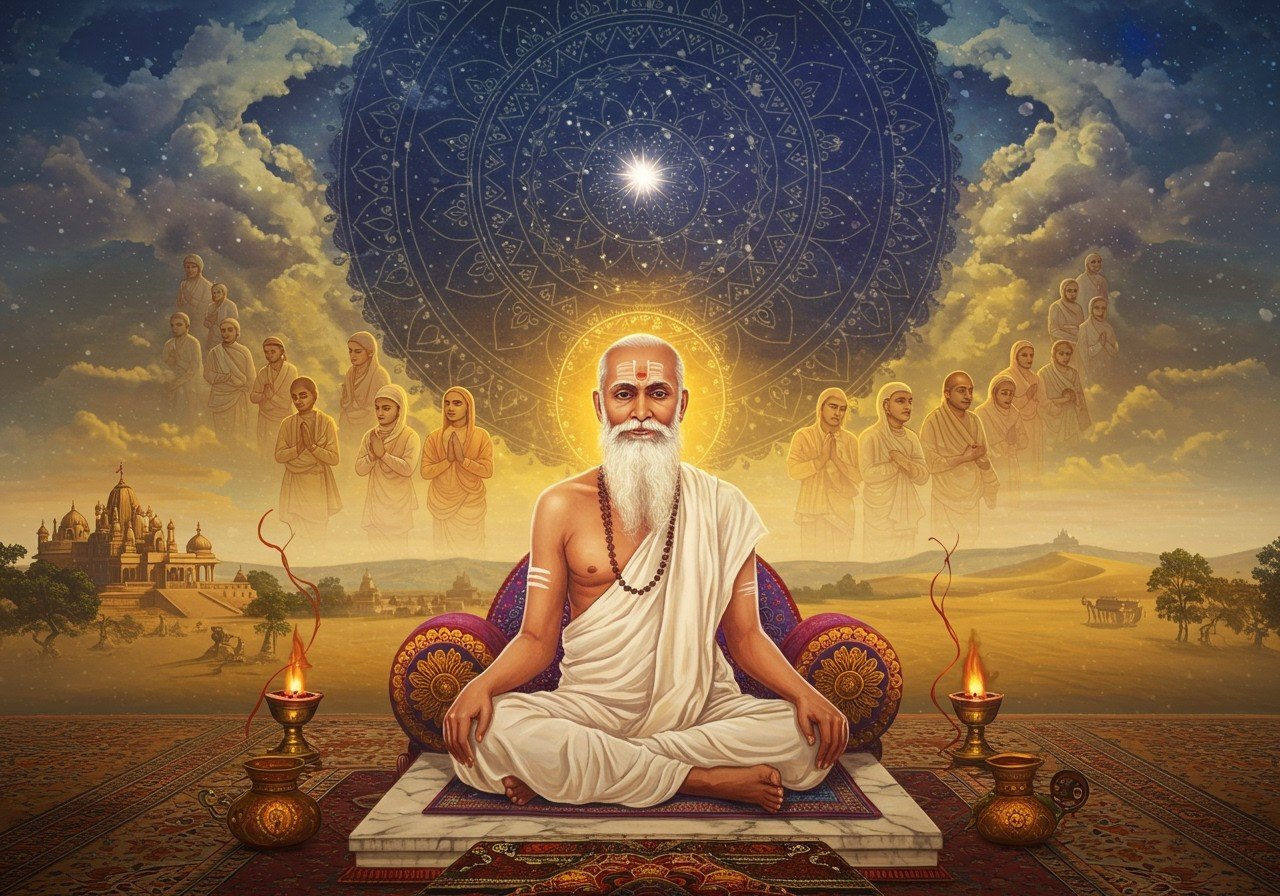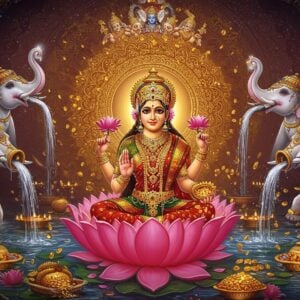
The Bhakti Movement, a transformative spiritual and social phenomenon in India (7th-17th century), revolutionized the relationship between the divine and devotees. It emphasized love and devotion as paramount. Dadu Dayal emerged as a central figure, shaping the Nirguna Bhakti tradition, a path focused on worshipping a formless, attributeless God, challenging conventional practices, and fostering a direct, personal connection with the divine.
Dadu Dayal: Life, Teachings, and Legacy
Dadu Dayal, born in 1544 in Gujarat, became a revered poet and spiritual guide, disseminating the message of Nirguna Bhakti throughout India. His teachings championed love, equality, and devotion to a God without form. He founded the Dadupanth, a spiritual community that continues to follow his principles today. His prolific literary contributions include over 5,000 verses emphasizing unity, non-violence, and a rejection of ritualism and caste distinctions. Dadu’s inclusive spiritual approach transcends religious boundaries, inspiring followers across generations.
Dadu Dayal and the Path of Nirguna Bhakti
Dadu Dayal, a mystic poet and saint, stands as a prominent figure in the Bhakti Movement. Born in Gujarat in 1544, he eventually moved to Rajasthan where his teachings gained momentum. He advocated for Nirguna Bhakti, a form of devotion centered on a formless God. This path differed from Saguna Bhakti, which focused on worshipping deities with physical attributes. Find out more about the deities and idols at poojn.in. We provide many options for all your spiritual needs.
Nirguna Bhakti encourages a personal connection with the all-encompassing divine. Dadu believed that God transcended all religions and sects. His emphasis was on love, compassion, and unity. He urged his followers to move beyond rituals and discover the divinity within themselves.
- Dadu’s Role: He was a spiritual master of Divine Light, Sound, and Love, stressing personal experiences with God. His teachings encouraged direct connection with the divine, fostering a deep and personal relationship. His teachings helped followers understand Nirguna Bhakti on a deeper level.
- Challenging Social Norms: Dadu’s teachings were revolutionary for their time. He opposed the caste system and advocated for spiritual equality, recognizing the inherent divinity in every individual. He emphasized love, compassion, and unity, promoting a society free of social hierarchies. His teachings promoted spiritual equality, ensuring everyone had the opportunity for personal growth.
Dadu Dayal’s influence attracted numerous followers, including his 52 disciples known as the “52 pillars.” They played a key role in spreading his teachings and establishing the Dadupanth. This community continues to flourish, adhering to the principles established by their revered teacher.
Dadu’s life journey took him from Sambhar to Amber, near Jaipur, which became a center for his spiritual activities. Naraina, in the Jaipur district, served as a central hub for his teachings.
- Literary Works: Dadu’s literary works, comprising over 5,000 verses, are central to his legacy. These writings emphasize unity, non-violence, and a critique of ritualism and caste distinctions. His verses provide a valuable resource for understanding his philosophy and insights into the divine.
- Inspiration from Kabir: Dadu Dayal found inspiration in the teachings of Kabir, another prominent Bhakti saint. They shared a belief in Nirguna Bhakti and a critique of organized religion. Dadu further developed these ideas, emphasizing inner purity and moral conduct. He added his unique perspective to the concept of formless devotion.
Dadu Dayal’s encounter with Emperor Akbar, known for his religious tolerance, highlighted his inclusive approach. This meeting fostered dialogue and contributed to the discourse on religious plurality within Akbar’s court.
Dadu Dayal’s philosophy, centered on love and social reform, encouraged simplicity and selfless service. His teachings remain relevant today, offering guidance for addressing contemporary social issues.
Poojn.in: Supporting Your Spiritual Journey
Poojn.in is committed to supporting devotees in their spiritual practice, offering a wide variety of authentic puja items and spiritual materials. As India’s leading Dashakarma Bhandar, we provide essentials aligned with traditions like Nirguna Bhakti, allowing you to find everything you need in one place.
For Krishna bhakti, central to many Bhakti saints including Dadu Dayal, we offer:
- Pure Cotton Wicks for Aarti: Crafted from pure cotton, these wicks ensure a clean and bright flame for your aarti rituals, enhancing the sanctity of your worship.
- Brass Diyas and Lamps: Our collection of brass diyas and lamps adds a touch of traditional elegance to your altar, creating a serene atmosphere for prayer and meditation.
- Natural Incense Sticks: Made from natural ingredients, our incense sticks offer a fragrant and calming atmosphere, fostering a deeper connection with the divine during your puja.
- Pure Ghee for Deepak: Pure ghee is considered sacred and is offered in deepaks to invoke blessings and positive energy. Using pure ghee enhances the spiritual significance of your offerings.
- Tulsi Mala for Japa: The Tulsi mala is considered sacred and is used for japa meditation, helping devotees focus their minds and connect with the divine.
- Brass Bells for Worship: The ringing of brass bells is believed to purify the atmosphere and invoke divine presence, creating a sacred space for worship.
These items support both Saguna and Nirguna forms of worship, allowing devotees to practice their faith according to their chosen path. Our products adhere to strict quality standards, ensuring they are suitable for sacred use.
Visit www.poojn.in to explore our complete range of puja items. We deliver across India, bringing authentic puja materials directly to your home.
The Enduring Legacy of Dadu Dayal and Nirguna Bhakti
Dadu Dayal’s teachings and the Nirguna Bhakti movement have left an indelible mark on Indian spirituality and society. By advocating for devotion to a formless God, Dadu encouraged a direct, personal experience of the divine. His emphasis on love, compassion, and unity challenged social norms and promoted spiritual equality. Through his poetry and inclusive philosophy, Dadu inspired countless followers and established a community that thrives to this day. His teachings offer guidance for a life rooted in love, humility, and service. The legacy of Dadu Dayal reminds us that true spirituality transcends ritual and embraces the divine within each of us.
FAQs on Dadu Dayal, Nirguna Bhakti, and the Bhakti Movement
Who was Dadu Dayal? Dadu Dayal, a prominent figure in the Bhakti Movement, was a revered saint and poet known for promoting Nirguna Bhakti, the devotion to a formless God. His teachings significantly impacted spiritual thought and practice during his time.
What is the Bhakti Movement? The Bhakti Movement, spanning from the 7th to the 17th century, was a significant spiritual and social reform movement in India. It emphasized personal devotion to God, challenging traditional rituals and caste hierarchies. The movement fostered a more inclusive and accessible approach to spirituality.
How did Dadu Dayal contribute to the Bhakti Movement? Dadu Dayal played a crucial role in the Bhakti Movement by spreading the teachings of Nirguna Bhakti. Through his poetry and teachings, he emphasized devotion to a formless God and promoted equality among all people. His work contributed to the democratization of spiritual practice.
What is Nirguna Bhakti? Nirguna Bhakti is a form of devotion in Hinduism that focuses on worshipping a God without form or attributes. It emphasizes inner spirituality and a direct connection with the divine rather than external rituals or idol worship. This path encourages seekers to find God within themselves.
How are Dadu Dayal and Kabir connected? Both Dadu Dayal and Kabir were influential figures in the Bhakti Movement who advocated for Nirguna Bhakti. They shared similar views on devotion, equality, and rejection of rigid rituals and caste distinctions. Their teachings inspired generations of followers seeking a more personal and inclusive spiritual path.
What was Dadu Dayal’s interaction with Akbar? Dadu Dayal met with Emperor Akbar, known for his religious tolerance and interest in various spiritual traditions. Akbar respected Dadu’s teachings and philosophy, reflecting the spirit of interfaith dialogue during that era. This interaction highlighted the acceptance and understanding of different spiritual paths.
What is Dadu Dayal’s philosophy? Dadu Dayal’s philosophy centers around devotion to a formless God, promoting equality, humility, and compassion. He believed true spirituality stemmed from within, emphasizing inner transformation and selfless service. His teachings encouraged a life of simplicity and spiritual awareness.
How did Nirguna Bhakti impact India? Nirguna Bhakti significantly impacted Indian society by challenging social barriers based on caste and religion. It promoted unity and devotion to a single, formless God, fostering a sense of inclusivity and spiritual equality. This form of Bhakti contributed to a more democratic and accessible understanding of spirituality.


